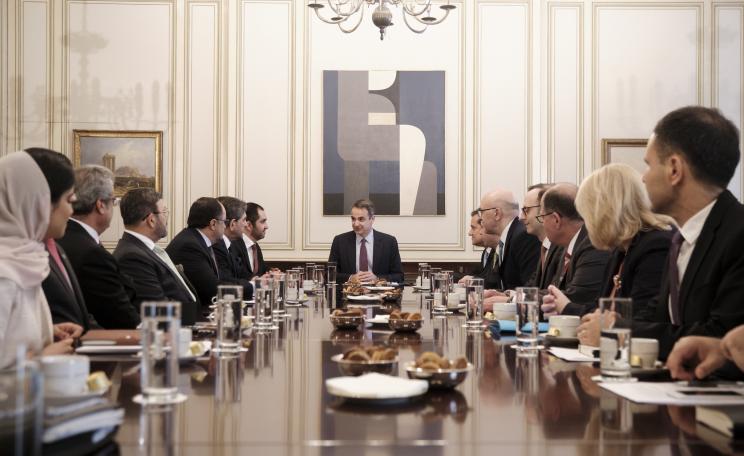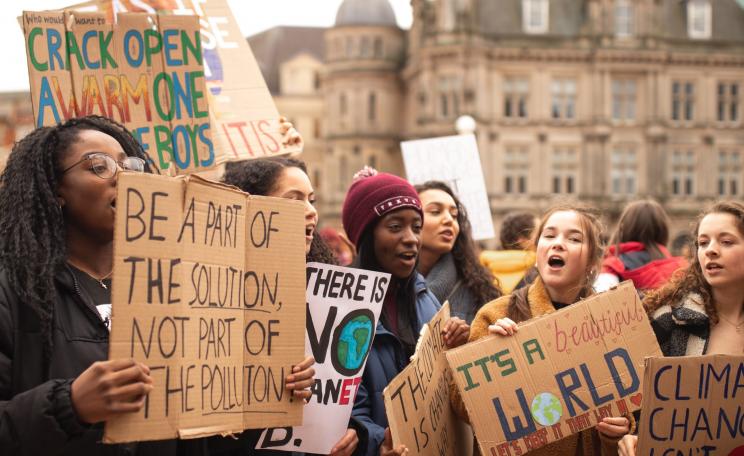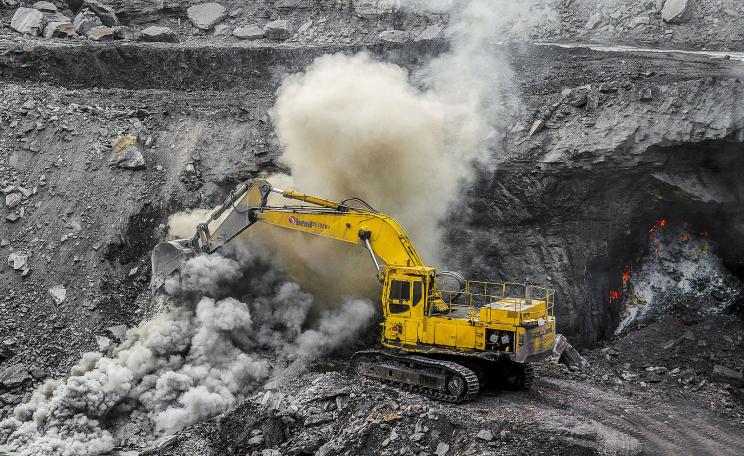We're hoping to move the UNFCCC secretariat to stop governments that are supposed to be representing the public from supporting the fossil fuel industry.
A movement to kick oil, gas and coal lobbyists out of politics is gaining momentum in Europe, its advocates claim.
An event in the European Parliament discussed for the first time how the fossil fuel industry was responsible for the energy and cost of living crisis, and that lobbying by the industry should be restricted to protect human health and the environment.
The hearing by a cross-party group of MEPs followed a call from 91 organisations from the Fossil Free Politics coalition - anti-poverty groups, trades unions and climate organisations across Europe who are campaigning for a firewall between the fossil fuel industry and climate policy.
Moratorium
MEPs including Marie Toussaint MEP (Greens, France), Pierre Larrouturou MEP (Socialists & Democrats, France) and Cornelia Ernst MEP (The Left, Germany) spoke out against fossil fuel lobbyists, outlining how they had been deliberately blocking climate action for decades. All called for them to now be barred from interfering in policymaking, using similar rules that restrict the tobacco industry’s influence in health policy.
Speaking at the hearing, Anna Gilmore, professor of public health at the University of Bath and founding director of the Tobacco Control Research Group at the University of Bath, urged the creation of “an article 5.3 for fossil fuels”.
The World Health Organisation Framework Convention on Tobacco Control (WHO FCTC) is a global health treaty designed to help countries work to eliminate the harm caused by tobacco. Article 5.3 aims to protect public health policy from the influence of the tobacco industry by excluding it both from policymaking at the WHO, and through a legal requirement at the level of individual governments.
Research by Gilmore has documented the many parallels between the lobbying tactics of tobacco and fossil fuel industries, such as spreading misinformation and even colluding on regulatory campaigns at EU level.
Speaking on behalf of the European Commission, Brendan Devlin, director general for energy at the European Commission and adviser on the fossil fuel phase out said that the commission had supported a phase out of fossil fuels at COP28, and was also promoting a moratorium on oil and gas extraction in the Arctic.
Delegates
However, he sidestepped the issue of access of the fossil fuel industry to the EU’s decision-making process, saying that he would address questions as they came up, despite being the final speaker at the session.
Despite the commission’s stated position on fossil fuel phase out at COP28, it allowed five fossil fuel lobbyists access to COP28 as part of its delegation, including ExxonMobil's vice president of EU affairs Nikolaas Baeckelmans, BP Executive Vice President Giulia Chierchia and the CEO of Hydrogen Europe Georgios Chatzimarkakis, according to Corporate Europe Observatory. This is on top of nearly 130 fossil fuel lobbyists allowed access to the summit via EU member state governments such as France, Belgium and Italy.
We're hoping to move the UNFCCC secretariat to stop governments that are supposed to be representing the public from supporting the fossil fuel industry.
Overall attendance by the fossil fuel industry at COP28 was at record levels, with more than 2,450 fossil fuel lobbyists registered to attend, almost four times as many as at COP27 in Egypt, it added.
There was also a doubling in representatives from agribusiness at COP28 compared with COP27, with 340 registered, analysis by DeSmog revealed. Around a third of these were from meat and dairy companies. More than 100 delegates travelled to Dubai as part of a country delegation, up from 10 in 2022.
Being part of a country delegation grants access to far more than if someone is just registered as a standard business delegate, explained Pascoe Sabido, researcher and campaigner for Corporate Europe Observatory.
Disclose
Individuals with government delegation badges can attend meetings that are off limits to other delegates, such as civil society observers and media. Crucially, they have access to government office areas, he said.
“That's where all the ministers will be, and the negotiators, and they're allowed straight into the area with all of that decision makers. You can set up your meetings, grab people in the corridor, have impromptu bumpings into and so on,” he added.
Following COP28, the EU Greens group of MEPs wrote to the European Commission expressing concern that the situation undermined the EU’s credibility at COP. The letter asked the commission to clarify the rules and procedures for granting of party overflow badges to external personnel, and to urge the establishment of a clear list of criteria when handling overflow badges to non-government officials.
The commission did not respond to the letter, according to Jutta Paulus, the EU Greens’ spokesperson for environmental affairs. It also did not respond to a request for comment by The Ecologist.
The revelations of numbers of lobbyists at COP28 were possible due to a new rule brought in by the UN body that runs the summit (UNFCCC) mandating all delegates to disclose who they represented when registering.
Profits
The UNFCCC then published a full list of delegates, including those bought in by governments on so-called ‘overflow’ badges, which can be arranged up until the night before COP starts.
“This is the first time we had access to the overflow list, and this is where most of the fossil fuel lobbyists bought by governments were coming in,” said Sabido.
The new rule followed years of campaigning by organisations including Corporate Observatory Europe and members of the Kick Big Polluters Out coalition. Initial attempts to get the change agreed by governments were blocked by countries including the US, EU, Canada and Australia, so the campaigners instead asked the UNFCCC secretariat to intervene, Sabido explained.
The campaign has been calling for the UNFCCC to introduce accountability rules that establish protocols around conflicts of interest at COPs, and how these should be monitored and enforced. It is pushing for EU support, but so far the EU has maintained its position that all industries should be involved at climate talks, Sabido said.
This stance has previously been widely supported, including by former UNFCCC executive secretary Christiana Figueres. However, last year, she publicly stated that she had been wrong to support the involvement of fossil fuel companies, writing in an op-ed in Al Jazeera: “Their unprecedented profits over the past year have shown their unwillingness to adapt. It’s now D-Day for them.”
Negotiations
Last year, more than 100,000 people from across Europe signed a petition urging governments to kick polluters out of politics, while more than 100 organisations including trade unions and anti-poverty networks support an overhaul of the political system to restrict the influence of private corporations on decision making.
Tom Evans, senior policy advisor in climate diplomacy and geopolitics think tank E3G, believed that the idea of keeping fossil fuel companies out of talks in a similar way to the tobacco example was realistic but would likely take some time.
“I can imagine a situation where you might have enough countries that believe this is an important matter, and push it forward. Ultimately, those sorts of policies would have to be agreed by all countries, so it’s maybe a question of how much political capital do they want to put behind that? I don’t think we’ve seen any big countries say this publicly,” he said.
According to Gilmore, negotiations on the WHO FCTC took a long time, beginning in 1995. The treaty was adopted in 2003, and came into force in 2005. They also started from a different place, she pointed out.
“When the treaty negotiations started, the aim was to exclude the tobacco industry because it was recognised as part of the problem. This is different to climate because the fossil fuel industry is already all over those treaty negotiations,” she said.
Translate
Though the climate negotiations needed to move to the same position as talks on tobacco, it would not be straightforward, she believed. “These corporations are so powerful now - they use their resources to buy access and influence and change norms, so that people have been hoodwinked into thinking that they’re part of the solution when they are not,” she said.
Paulus believed that getting fossil fuel companies out of policy making would be more complicated than was the case with tobacco companies. “Fossil fuel companies can always say that they are changing their business models so they have to be part of the talks, whereas the tobacco industry only sold tobacco,” she said.
She pointed to another complication. In many countries, fossil fuel companies were state-owned, so individuals could have a dual-function, such as Sultan Al Jaber, who was president of COP28 and CEO of the United Arab Emirates’ state-owned oil company, Adnoc, she pointed out. “The UNFCCC cannot ban government representatives.”
Sabido acknowledged that it would be important to involve fossil fuel companies in some parts of the energy transition, such as for decommissioning infrastructure. “But they shouldn't be involved in the political decision making which decides how quickly and how much we need to cut emissions - that should be led by science,” he said.
“This has really grown as an issue. As it becomes more flagrant, I think people realize that the capture of this process is really important. I'm seeing more voices get involved, and we're hoping to translate that into political power to move the UNFCCC secretariat to stop governments that are supposed to be representing the public from supporting the fossil fuel industry,” he concluded.
This Author
Catherine Early is a freelance environmental journalist and chief reporter for The Ecologist. She tweets at @Cat_Early76.






